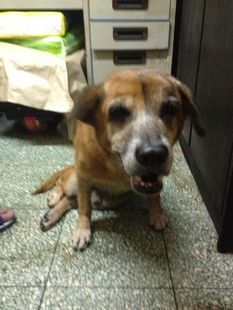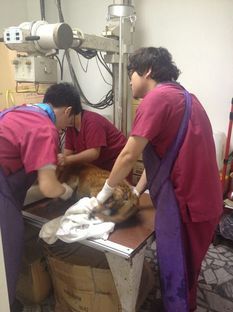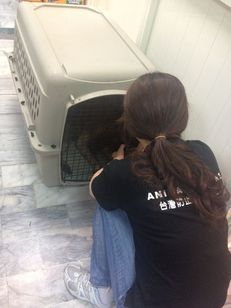
The Taiwan SPCA received a report in mid May, about a dog whose hind limbs seemed to be paralyzed and who was dragging himself around the streets of YongHe. It wasn’t clear if he had an owner, and if he did if they were providing adequate medical care, so the Taiwan SPCA went to the scene as soon as the call was received.
Once the TSPCA investigators arrived on the scene, they spoke with the owner and found that he was a frail 80 year old man who was not able to pick up or carry LaiFu to the vet clinic himself. He said LaiFu was at least 12 years old and suddenly became paralyzed a couple of days prior. The SPCA investigators knew he had to have immediate medical attention so took him to the vet with the owner’s consent. The vet took an X-Ray and found the paralysis was caused by Spondylosis of his spine (bone spurs), a common problem with older dogs. Unfortunately the only ‘cure’ for this problem is surgery, but sadly LaiFu is too old and frail for surgery, so with our vet’s advice we decided on a more conservative therapy of pain maintenance with pain medication.
After the SPCA investigators brought LaiFu home, they not only provided his owner with all his medications but also gave him some supplements such as canned food to improve his appetite and flea and tick prevention to help with his skin condition. After explaining clearly about LaiFu’s condition to his owner, we also let him know that dogs shouldn’t be fed greasy salty ‘lunchbox’ food as they’re not only bad for the health, but also very bad for animal’s skin. LaiFu’s owner told us, with tears in his eyes, that considering his own age, frailty and financial situation, he was not able to maintain LaiFu's quality of life and had planned to call the government shelter and ask them to euthanize Lai-Fu to relieve him of his pain, but in the end he just couldn't do it. Luckily because of the kindness and concern of passersby the SPCA was informed and were able to get LaiFu the medicine and food needed.
At the vet’s, we were even given a somber prognosis; that euthanasia might be the only option if LaiFu’s owner was not able to provide the care needed. Bone spurs are very painful and often dogs who drag themselves around will develop ulcers of the skin, inflammation of the limbs and wont’ be able to control where they urinate or defecate. Surprisingly, a couple of days after taking pain meds, LaiFu was not in as much pain and was able to stand up and walk at a slow pace. All animals have a strong will to survive just as people do and they should not be given up on so easily. Sick or injured animals should at least be given proper treatment and medical management before any rash decisions are made, this is usually all that is needed, as well as patience. Don’t underestimate the power of the Internet to help situations like LaiFu’s. And finally, keep in mind relinquishing animals to the government shelters should always be the very last possible choice.
A friendly reminder from the SPCA, if you come across any situations that seem like an animal is being abused or neglected, please contact the Taiwan SPCA.
If you’d like to report an animal abuse case or search for other relevant information, please go here.
If you support the Taiwan SPCA’s work please make a kind tax deductible donation today.



Animal Protection Act:
Article 5 A pet owner shall be twenty years of age or above. As for teenagers under the age of twenty years raising animals, their legal representative or legal guardian shall be the pet owner.
The pet owner is obligated to provide the animal he or she keeps with the following:
1. Adequate food, water and sufficient room for the animal to move around
2. A safe, shaded, ventilated, illuminated, warm and clean living environment
3. Necessary prevention and cure of statutory animal infectious diseases
4. Protection against vicious or unjustified disturbance, maltreatment or harm
5. Other appropriate care
Pet owners shall not abandon animals they keep, but may send the animals to animal shelters or places designated by the municipal or county (city) competent authority.

